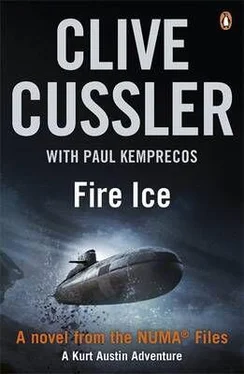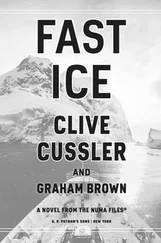"That was the popular term, but it isn't accurate. Tides come from gravitational forces such as the moon, sun and planets. Even we scientists were wrong. We called them seismic sea waves, which implies that earthquakes generate all tsunamis. A quake is only one cause."
"You think a quake caused that mess out there?"
"Yes. No. Maybe." He grinned at the chief's befuddled reaction and ripped a sheet of paper off the pad. "Here's the real culprit." He held the paper horizontally. "Make believe this is the ocean bottom." He pushed the ends in so that the middle of the paper humped up. "A quake occurs when tectonic plates bump together and deform the seafloor. This hump pushes up the column of water all the way to the surface. The water tries to regain its equilibrium."
"You're losing me."
Jenkins thought for a moment. "It's like Joe Johnson, the town drunk, staggering home after a night on the town. Reason he zigzags is because the booze has affected his equilibrium. He has to keep catching himself from going off in the wrong direction. Sometimes he can't stop and slams into a wall and knocks himself out." He frowned. "Okay, it's a rough analogy."
"I get the picture."
"Think of Joe as that column of water and the wall as the Maine coast. Only difference is the wall gets the worst of it not, Joe."
"How come every wave isn't a potential tidal wa – I mean tsunami ?"
"I knew your policeman's logic would come into play. Two reasons. Time and distance. The time between waves hitting the beach is five to twenty seconds. With a tsunami, that time can be ten minutes to two hours. The distance between waves is called the wavelength. Beach waves can be three hundred to six hundred feet apart. With a tsunami, you're talking three hundred miles-plus."
"I've seen some pretty destructive beach waves."
"So have I. But even an ordinary wave crashing on the beach only has a short life and a speed of ten to twenty miles per hour. Your tsunami has had hundreds of miles and hours to build up its energy. The deeper the water, the faster the wave. That's why a tsunami can hit six hundred miles per hour as it crosses the ocean, even though ships don't feel it and you can't see it from the air. Let me give you an example. In 1960, an offshore quake near Chile sent a wave across the Pacific. The wave was no more than three feet high. Twenty-two hours later, when the wave hit the coast of Japan, it was twenty feet high and killed two hundred people. The waved bounced around the Pacific for days, causing damage wherever it touched."
"If it's only a ripple in the ocean, how'd you figure this was going to be a big one?"
"I was lobstering out on the ledge where it's comparatively shallow. The wave slowed down when it hit the shallows and started to peak. It was moving slower, but all the energy it built up was still there. That energy has to go somewhere. When the wave approaches shore, the mousy little sea grows up into a monster. Sometimes it builds up into a great towering wave. It might be a bunch of series of breaking waves, or a bore, like a bunch of steps with a steep breaking front. It might suck out the water and spit it back out."
"That's what happened with us. Like someone pulled the plug out of the harbor."
Jenkins nodded. "Tsunamis are fascinating and very adaptive critters. Reefs, bays, entrances to rivers, can affect the damage, the slope of the beach. The waves can crest to one hundred feet or more, but mostly they just surge. All depends on what's in the way. They can wrap around a headland and cause damage on the opposite side of an island. When they get squeezed, they become really dangerous, because you've got all that intensity built up in a small space." He pointed out the window at a river that fed into the harbor. The high banks were littered with debris. "They can even go up rivers, as they did here."
"Good thing the condos Jack Schrager built on the banks of the river weren't occupied, or there would be a lot of dead people floating around in that harbor instead of scraps of wood. Damned lucky you saw those waves and recognized their threat."
"More than lucky." Jenkins clicked his computer mouse and pulled up a map of the world with arrows pointing to various countries. "In the decade starting in 1990, tsunamis killed more than four hundred people and caused billions of dollars in damage." He tapped the screen. "This one in Papua New Guinea was a real horror. The wave was forty- five feet tall when it hit along nineteen miles of coast. A few minutes later, there were more than two hundred people dead."
He switched over to a simulation. "This is an animation of a quake-generated wave attacking a Japanese village back in 1923. You see a lot of big waves in the Pacific. It's surrounded by the 'rim of fire,' all those tectonic plates that shift every so often."
"Hate to be so parochial, but we're talking the Atlantic, not the Pacific, and the coast of Maine, not Japan. I've lived here all my life and I've yet to hear about a quake."
"You've probably had more minor tremors than you know of, but I agree, that's why I started thinking about other causes. Tsunamis caused by landslides are less common. Then you've got volcanic eruptions and large meteorites."
"Not too many volcanoes around here that I know of." "Be grateful. The Krakatoa volcano created waves one hundred feet high and killed thousands back in 1883. If an asteroid five miles across landed in the mid-Atlantic, it would create a wave high enough to swamp the upper east coast of the U.S. New York would be wiped off the map."
"That leaves landslide."
"It's what we call a slump. Here – let me show you." Jenkins pulled up another map on the monitor. "This is Izmit Bay in Turkey. They had a slump-generated wave there that caused extensive damage."
"What caused the slump?"
"An earthquake." Jenkins chuckled. "I know, it's like asking which came first, the chicken or the egg? In general, a slump is caused by a quake. That's the problem with our Rocky Point ripple. There was a slump, but no quake."
"Are you sure?"
"Absolutely. I've talked to the folks at the Weston Observatory in Massachusetts. They keep tabs on all seismic disturbances in the area. They picked up some rumbles that indicated a slump, but no quake preceding it, as I'd expect. I heard a tremendous underwater boom shortly before I saw things happening. There was apparently a movement of ocean bottom east of Maine, but without the normal crash of tectonic plates. I've talked to tsunami experts all around the country. Nobody has heard of such a thing."
"Then we're stumped."
"Not exactly." Jenkins brought the wave profile back onto the computer screen. "I've put together a simulation of our wave. It's pretty crude. Even with the best information, wave calculations can be complicated. You've got to factor in stuff like velocity, wave height and destructive force. Then you've got all the coastal features that cause a wave to deflect or diffract. You've got to calculate the effects of backwash from following waves."
"Sounds impossible."
"It nearly is. But not totally. A few years ago, scientists used computer-based mathematical modeling techniques to solve the demise of the civilization on Crete. Look, this is a map chart of the Maine coast. That's the harbor. The hardest hit was several miles from here, where some fishermen saw waves breaking over Newcomb's Rocks."
The chief whistled. "Those cliffs must be fifty feet high." Jenkins nodded and indicated the chart on the screen. An arrow pointed toward the land. "The main wave force was just to the north of here, so even with my warning, things could have been worse here at the cove. I don't even know if this house would have been safe."
The chief went pale. "That would have been the whole town."
Jenkins leaned forward and peered at the computer. "This is amazing. Look at how straight it came in. Almost like a child creating a wave in a bathtub."
Читать дальше












